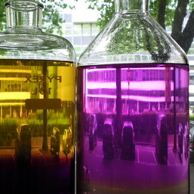Further Abstract
Piperine: a Further Study
History & Background
Piperine is the active (contributor to the taste) of both black and white pepper, but has a different effect in each case, due to the timing whereby each is extracted. Black pepper is taken from the unripe green berries of the vine (and then sun-dried), whereas the white pepper is taken from the ripe red berries, hence the much milder taste of the white.
Abstract
It is widely known that pepper leaves a severe burning sensation on the tongue when it is ingested. However, what is not picked up on is that the burning only after a few moments that it has been in contact with the tongue. Several other foodstuffs (and their chemical constituents) can be effected and thus tasted very promptly. The reason for the delayed action of the pepper is the nature of the piperine, that which gives it its 'fire'. Solid state piperine is not particuarly reactive at all, which is why it is essentially tasteless at first. However, upon solvation (namely in one's saliva) its reactivity increases greatly. The reasoning behind the strong reactivity of aqueous (or other solvated forms) of piperine comes in the form of its nature as a greatly unsaturated compound.
References
Extended thanks to the following locations and parties for the use of their material:
Piper nigrum Piperine: History & Characteristics Piperin Home Page (& subsidiaries)
Piperine & Other Medicinal Spices & Their Effects The University of California: Los Angeles, History and Special Collections: the Louise M. Darling Biomedical Library (Online)
